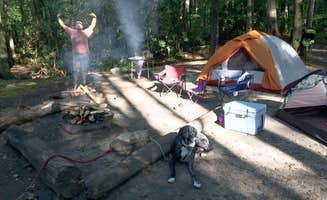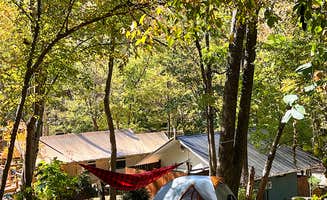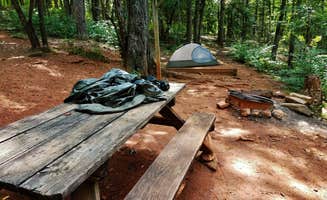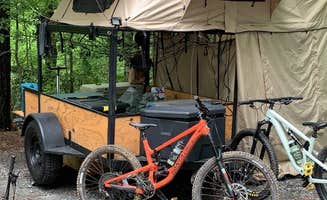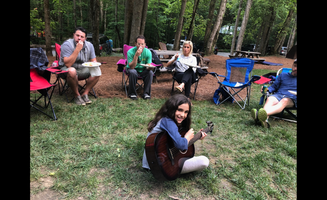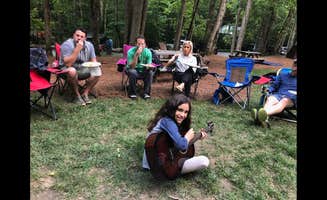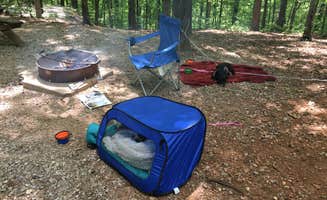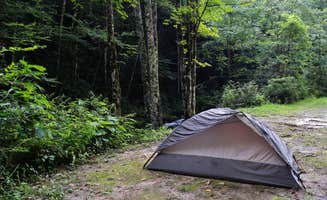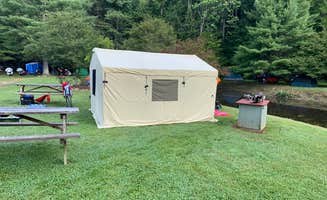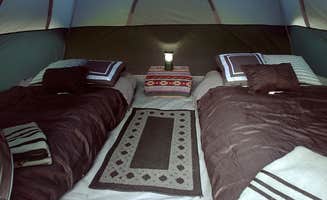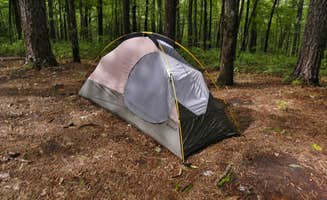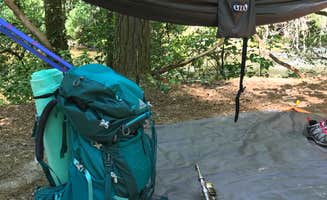Tent campsites near Tigerville, South Carolina provide access to the Appalachian foothills with elevations ranging from 1,000-3,000 feet. The region experiences mild winters with occasional snow and warm summers, with average temperatures in July reaching 85°F. Most primitive camping areas feature dense forest cover dominated by oak, hickory, and mountain laurel creating natural site separation.
What to do
Creek exploration: 1-2 miles from most campsites. At Jones Gap State Park Campground, campers can experience the pristine Middle Saluda River. John R. notes, "I love just coming here and hiking upstream and playing in the river. Great camping spots, all are hike in. Not far, but not car camping at all."
Waterfall hikes: Access within 0.5-3 miles. Jones Gap State Park Campground offers several waterfall options. Fain H. recommends, "Be sure to check out Rainbow Falls a 90ft free falling waterfall that's about 2 1/2 miles from the campsites."
Technical climbing: Various skill levels accommodated. Mountain Bridge Wilderness Area provides challenging terrain. Maddi P. shares, "Wonderful trails with breath taking views and technical climbs plus discrete camping. It's a trip I recommend to all of my camping and hiking friends."
Night sky observation: Best viewing June-September. The limited light pollution at most campsites creates ideal stargazing conditions. During summer months, campers can view the Milky Way core between 10 PM and 2 AM from higher elevation sites.
What campers like
Riverside camping: Sites within 50 yards of water. At Jones Gap State Park Campground, Sara M. appreciated her "Gorgeous site, a bit chilly by the river but beautiful and close enough to still use the park bathrooms!"
Natural sound barriers: Creek noise provides privacy. Many campers value the natural soundscapes. Laura C. from Jones Gap describes, "Having both toddler and dog we knew we couldn't go far but this still felt like we were in the middle of nowhere."
Wildlife viewing: Dawn and dusk provide best opportunities. Pine Point Primitive Campground offers good wildlife habitat. One camper noted the sites are "close to the lake, and the site that I chose has a short trail down to it through the woods."
Trail connectivity: Access without driving. Many primitive campsites connect directly to extensive trail systems. Kevin G. from Jones Gap observes, "It is of note that the trail is right by the river, so you will see people walk by and there isn't any real greenery to block that, even in summer."
What you should know
Site spacing varies significantly: 200-1,320 feet. Unlike developed campgrounds with uniform spacing, primitive sites have irregular distribution. Kevin G. notes at Jones Gap, "It is however far enough from the nearest sites that you won't hear or see anyone else after sundown unless they are hiking at night."
Water access challenges: Plan for carrying/filtering. Jocassee Gorges Wildlife Management Area has limited facilities. Erica explains, "There's no water spigots, bathrooms, or amenities other than a fire ring, and cell service is spotty so this is truly a down-to-basics getaway."
Trail difficulty classifications: Know before you go. Some access trails require moderate fitness levels. Stacy B. describes Jones Gap site access: "The trail is moderately difficult with lots of rocks. We went the day after a light rain and there were many muddy area where water was running to to the big stream."
Reservation complexities: Different systems for different areas. Check reservation requirements 2-4 months in advance for peak seasons. Some areas utilize different reservation platforms based on managing agency.
Tips for camping with families
Choose sites based on hiking distance: Under 1 mile for young children. Wilderness Cove Campground offers accessible options. Dave notes, "The tent camping is not quite 'roughing it': there's pretty reliable WiFi and the bath house is air conditioned and kept very clean."
Select sites with natural play features: Rocks, shallow water. Laura C. describes her Jones Gap experience: "Spot is right on the river and a great place to catch some sun on the rocks or rock hop. There are several hike options right from your site including a nice little waterfall."
Prepare for variable weather: 15-20°F temperature swings common. Pack clothing layers for all family members, particularly for spring and fall camping when overnight temperatures can drop significantly below daytime highs.
Consider reservation timing: Mid-week visits reduce crowding. Family-friendly campgrounds often reach capacity on weekends, especially during summer months. Tuesday-Thursday arrivals provide better site selection and quieter conditions.
Tips from RVers
Road access limitations: Research before travel. Most primitive camping areas have limited RV access. For RVers, Asbury Hills Summer Camps provides more accessible terrain. Maddi P. notes, "There's a few [trails] within the camp some including caves, waterfalls, and river cable crossings."
Alternative base camping: Use developed sites for day trips. RVers often stay at established campgrounds with hookups while making day trips to more remote areas for hiking and exploration.
Low clearance challenges: Scout potential obstacles. Many forest roads leading to primitive campsites contain washouts or protruding rocks that may damage RV undercarriages. Dave from Wilderness Cove Campground warns, "My car's low clearance had me scraping my underside on some rocky bumps inside the property."


